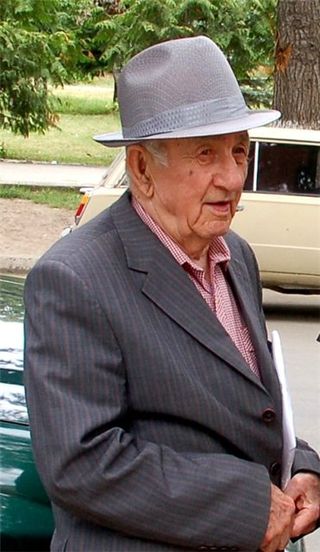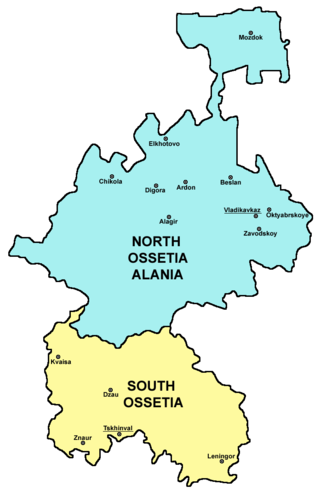| | |||||
| |||||
34 seats in the Parliament 18 seats needed for a majority | |||||
| |||||
 |
|---|
| Constitution |
Parliamentary elections were held in South Ossetia on 23 May 2004.
| | |||||
| |||||
34 seats in the Parliament 18 seats needed for a majority | |||||
| |||||
 |
|---|
| Constitution |
Parliamentary elections were held in South Ossetia on 23 May 2004.
At the time of the election, South Ossetia's parliament had 34 seats, an increase from 33 in 1999. Of these, 15 were elected by party-list proportional representation, 15 were elected by single-member district plurality voting, and four were designated for the Georgian minority who consistently boycotted elections. [1] This election was the last time this system was used, as in the 2009 election, all 34 seats were filled using party-list proportional representation.
As of 13:00 local time, 52% of registered voters had cast their votes, crossing the electoral threshold of 50% plus one vote. The South Ossetian election commission has thus declared the elections valid. [2]
The election was won by President of South Ossetia Eduard Kokoity's Unity Party, which got 9 of the 15 party-list seats (54.6% of all votes), as well as another 11 constituency seats, giving the party a controlling 20-seat majority. Znaur Gassiyev of the Unity Party was elected speaker, replacing Stanislav Kochiev of the Communist Party of South Ossetia. Gassiyev was one of the leaders of the Republic of South Ossetia in its forming days in the early 1990s, and acted as Head of State in 1991.
| Party | Votes | % | Seats | |||||
|---|---|---|---|---|---|---|---|---|
| PR | FPTP | Total | ||||||
| Unity Party | 54.6 | 9 | 11 | 20 | ||||
| Communist Party of South Ossetia | 27.4 | 4 | ? | ? | ||||
| People's Party of South Ossetia | 11.4 | 2 | ? | ? | ||||
| Independents | 6.4 | 0 | ? | ? | ||||
| Against all | 2.9 | – | – | – | ||||
| Vacant | 0 | 0 | 4 | |||||
| Total | 15 | 15 | 34 | |||||
| Source: , , [ dead link ] | ||||||||

South Ossetia, officially the Republic of South Ossetia – the State of Alania, is a partially recognised landlocked state in the South Caucasus. It has an officially stated population of just over 56,500 people (2022), who live in an area of 3,900 square kilometres (1,500 sq mi), on the south side of the Greater Caucasus mountain range, with 33,000 living in the capital city, Tskhinvali. Only Russia, Venezuela, Nicaragua, Nauru, and Syria recognise South Ossetia as a sovereign state. Although Georgia does not control South Ossetia, the Georgian government and the United Nations consider the territory part of Georgia.

The Georgian–Ossetian conflict is an ethno-political conflict over Georgia's former autonomous region of South Ossetia, which evolved in 1989 and developed into a war. Despite a declared ceasefire and numerous peace efforts, the conflict remained unresolved. In August 2008, military tensions and clashes between Georgia and South Ossetian separatists erupted into the Russo-Georgian War. Since then, South Ossetia has been under Russian occupation.

The Communist Party of South Ossetia is a communist party in South Ossetia. The party was founded in 1993. As of 2004, the party claimed a membership of 1,500. The party seeks recognition of the Republic of South Ossetia, which is considered by most countries as part of Georgia

Parliamentary elections were held in Russia on 12 December 1993. They were the first parliamentary elections in post-Soviet Russia and the only time to the Federation Council, with future members appointed by provincial legislatures and governors.

Parliamentary elections were held in South Ossetia on 31 May 2009. The result was a victory for the ruling Unity Party, which won seventeen of the 34 seats. Two opposition parties were not permitted to run out of concern that they might not be loyal to President Eduard Kokoity.
The Unity Party was a major political party with a socially conservative ideology in South Ossetia during the 2000s. South Ossetia is a partially recognized Caucasian republic, considered by most countries to be a part of Georgia. The Unity Party, founded in 2003, supported former President Eduard Kokoity, and was for a decade the largest political party in South Ossetia. After the 2009 elections, the party held 17 out of 34 seats in South Ossetia's parliament. It is modeled after and is closely linked to the United Russia party, with which it has signed an inter-party cooperation agreement. The party is a winner of the 2004 and 2009 parliamentary elections.

The Parliament of South Ossetia is the unicameral legislature of the partially recognized Republic of South Ossetia. The 34 members of parliament are elected using a mixed system of Party-list proportional representation (17) and single-member districts (17). South Ossetia has a multi-party system, and currently 5 political parties are represented in parliament and has 6 independent MPs elected through single-member districts. The parliament is headed by a speaker, who is elected from among the members. Since 15 september 2022 the speaker of parliament is Alan Alborov, one of the four deputees of the Nykhaz party of president Alan Gagloev, after Alan Tadtaev of United Ossetia was forced to resign.
Zurab Revazovich Kokoyev is a South Ossetian politician and was a member of South Ossetia's parliament, where he was one of three vice-speakers, and Chairman of the Committee for construction, industry, transport and communications. He is the leader of the Unity Party, which is allied with former President of South Ossetia Eduard Kokoity.
Merab Ilyich Chigoev was a Georgian South Ossetian politician and former Prime Minister, from August 1998 until June 2001. He was also Minister of Justice in Yury Morozov's cabinet.

Znaur Nikolayevich Gassiyev was a South Ossetian politician, who was one of the leaders of the South Ossetian independence movement in the early 1990s, which culminated in the 1991–1992 South Ossetia War.

South Ossetia elects on the national level a head of state—the President—and a legislature. The president is elected for a five-year term by the people. The Parliament of South Ossetia has 34 members, elected for a five-year term using party-list proportional representation.

Presidential elections were held in South Ossetia on 13 November 2011. A referendum was held on the same day. A run-off was held on 27 November, but the result were invalidated by the Supreme Court of South Ossetia. A new election was scheduled for 25 March 2012.

Alla Aleksandrovna Dzhioyeva is a South Ossetian teacher turned politician, who is currently Deputy Prime Minister in the South Ossetian government. She previously served as the Education Minister in 2002–2008. She won the 2011 presidential election, but the Supreme Court annulled the results, alleging that electoral fraud had been committed.

Anatoly Ilyich Bibilov is a Russian and South Ossetian military officer, was the 4th President of South Ossetia. He succeeded Leonid Tibilov as president on 21 April 2017 to 24 May 2022, following his election victory, but was defeated by Alan Gagloev in the 2022 election.

United Ossetia is a political party in South Ossetia founded in 2012. In the 2014 parliamentary election it won 20 out of 34 seats, clearing the majority in the Parliament of South Ossetia, unseating the Unity Party from power. In the 2019 elections the party lost its majority, while it could not secure a majority with other parties, resulting in a 'hung parliament'.

Parliamentary elections were held in South Ossetia on 9 June 2019.

Presidential elections were held in the disputed territory of South Ossetia on 10 April 2022. As none of the presidential nominees obtained at least 50% of the votes, a runoff was held on 8 May 2022, between the top two candidates, Alan Gagloyev and incumbent president Anatoly Bibilov.

South Ossetia is a partially recognized and Russian-occupied separatist state internationally recognized as part of Georgia. It is mainly inhabited by Ossetians, an ethnic group also dominant in North Ossetia, which is part of Russia. South Ossetia separated itself from Georgia following the 1991–1992 South Ossetia War with the help of Russia, remaining ever since as a state closely allied with this country.

David Georgievich Sanakoev is a South Ossetian political and public figure. He has served as chairman of two different South Ossetian political parties and as President Leonid Tibilov's Minister of Foreign Affairs.
Vladimir Kelekhsaev is a South Ossetian politician. He has served as the chairman of the political party Unity of the People since its creation. Although not Russophobic, he, and Unity of the People, are Russoskeptic, believing Russian interest in South Ossetia as simply a means to control the small de facto independent republic. He promotes a policy of economic independence and pragmatic foreign policy.